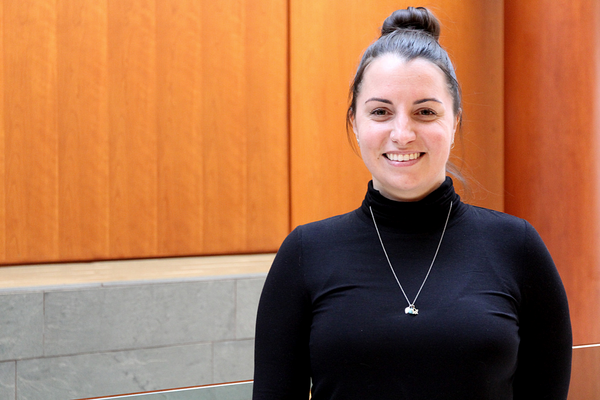Branching out into Indigenous research
March 1, 2018
Share

Alyssa Aiello (Artsci’18) wanted to find a research-based summer job during her second year of her Bachelor of Arts in Geography through the Department of Geography and Planning at Queen’s. She learned about the Undergraduate Student Summer Research Fellowship (USSRF) through one of her professors.
“At first I never thought it was something I could do until my third or fourth year,” says. Ms. Aiello. “Dr. Castleden introduced me to the program, and she had faith in me, so I had faith in myself – so I applied!”
Heather Castleden (Geography and Planning, Public Health Sciences) is the director of the Health, Environment and Communities Research Lab (HEC Lab), a research group co-located between Queen’s University and Dalhousie University. The HEC Lab researches social, environmental, and health equity issues using community-based participatory research. The Lab’s focus on Indigenous issues was of interest to Ms. Aiello, and seemed to be a perfect fit for her independent research project.
“The USSRF program is a great opportunity for intellectually keen undergraduate students; it builds their research skills with hands-on practice in an environment of mentorship, it allows them to earn a line of their academic CV in the category of scholarships - which will help them stand out in future scholarship competitions when they enter grad school, and it allows them to do paid work in an environment that aligns with their academic interests,” says Dr. Castleden. “The USSRF program is also a great opportunity for faculty. We get to bring bright and enthusiastic undergraduate trainees into our labs to help us with our research endeavours.”
Ms. Aiello worked in the HEC Lab, and created a research project focused on the ways Indigenous leaders were portrayed in national news media on renewable energy in 2016.
“I wanted to see how Indigenous leaders were being portrayed in the media to understand the conversation happening in the general public, and how that influences further development and policy,” says Ms. Aiello. “I chose to study news coverage in 2016 because the Truth and Reconciliation Commission report was released in 2015. I wanted to use that as a benchmark to see how they were portrayed post-report.”
Ms. Aiello analyzed four national news organizations: CBC, the Aboriginal Peoples Television Network (APTN), The National Post, and the Globe and Mail. She created a comparative media content analysis of their coverage of Indigenous leaders discussing renewable energy projects, policies, and budgets. She found that across all news sources, Canadian national news media portrayed Indigenous leadership in three primary roles; as protestors, partners, and participants. The Indigenous news source also portrayed Indigenous leaders as demonstrating stewardship, action-oriented involvement, and community-based in nature.
“This research can be a starting point for the HEC Lab. We brainstormed that it could go on to be a ten-year study, to see how the conversation around Indigenous voices in renewable energy is shaped, and how that could impact decisions over time," says Ms. Aiello.
In the fall after her fellowship, Ms. Aiello attended the Canadian Association of Geographers – Ontario Division (CAGONT) Conference in Kingston and presented her findings as a poster. She won the CAGONT Best Student Poster Award and enjoyed the opportunity to meet peers in her field, and present her findings to her local community.
“Being able to branch out into a new subject, research my own project, and get paid was very beneficial. Having the opportunity to conduct research in my undergrad, without the risk of grade-based consequences, made the process a lot less stressful,” says Ms. Aiello.
To learn more about the USSRF, visit the Queen’s University Research Services website. The application deadline for the 2018 summer program is March 9, 2018.